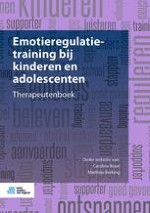Samenvatting
In dit hoofdstuk laten we zien hoe ouders cruciale partners zijn in het optimaal laten ontwikkelen van emotieregulatie bij kinderen. Ouders spelen namelijk op verschillende manieren een rol, zoals geconceptualiseerd in het model van Amanda Morris en collega’s (2007). Meer bepaald zijn ouders in de eerste plaats rolmodellen voor goede emotieregulatie. Ook kunnen ze specifieke opvoedingsvaardigheden hanteren om emotieregulatie te ondersteunen (emotie-coaching), en zorgen ze mee voor een emotioneel stabiel gezinsklimaat. Maar hun rol is niet unidirectioneel. In het model laten we zien hoe dit zich dit ontwikkelt in interactie met kindspecifieke kenmerken (zoals diens temperament) en hoe deze interacties dan bijdragen tot emotie-gerelateerde ontwikkelingsuitkomsten, maar ook, bij ongunstige ontwikkeling, tot depressieve symptomen of gedragsproblemen.
